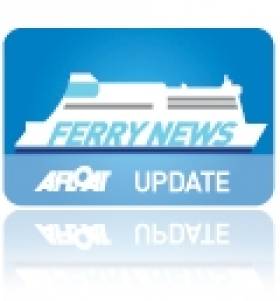Displaying items by tag: RosslarePembroke Dock
Irish Ferries is pleased to announce the addition of a new cruise ferry to its fleet with the introduction of the ship to be renamed Oscar Wilde.
Originally the cruiseferry called the Star served in the Baltic Sea and was built in 2007 in Finland for the Tallink Grupp, Afloat adds an Estonian shipping company.
The Oscar Wilde will be the largest and fastest passenger cruise ferry on the Irish Sea with an impressive capacity of over 2,080 passengers, 134 cabins, and ample space with over 2,380 lane meters for cars, coaches, and freight vehicles.
With the largest duty-free shopping space for any cruise ferry on the Irish Sea of more than 17,000 square feet, it will be an ideal shopping destination for those travelling between Ireland and Britain.
The ship interiors have a classic, modern feel and boasts Freight Drivers facilities, Club Class lounge, a self-service restaurant, an à la carte restaurant, a bar, gaming facilities, pet facilities and family-friendly features such as a children's play area.
One of the most exciting features of the Oscar Wilde is its available speed. With a possible top speed of 27.5 knots, it is the fastest cruise ferry with the largest passenger capacity on the Irish Sea.
This will enable Irish Ferries to offer tourism passengers and freight an efficient service, getting them to their destination reliably and comfortably.
Commenting on the new addition, Irish Ferries Managing Director, Andrew Sheen, said, "We are delighted to announce the addition of the Oscar Wilde to our fleet. This new ship will be a fantastic addition to our service, offering customers the very best in terms of comfort, speed, and amenities.
Along with usual advantages of ferry travel in terms of no luggage restrictions or security queues, we are confident that the Oscar Wilde will become a firm favourite with our passengers and freight drivers, and we look forward to welcoming them on board."
The Oscar Wilde will initially enter service on the Rosslare-Pembroke route in early June, replacing the chartered Blue Star 1 for the busy summer period.
With its impressive size, speed, and range of facilities, it is set to become the ultimate choice for those travelling between Ireland and the UK on the southern corridor between Wales and Ireland.
Ferry Go-Round
# FERRY NEWS - Irish Ferries French routes cruiseferry Oscar Wilde (1987/31,914grt) took over Rosslare-Pembroke Dock sailings with this morning's sailing, instead of the usual route vessel that operates on the southern corridor route, writes Jehan Ashmore.
Currently there are no services running to Cherbourg until February, though Oscar Wilde is covering in for the Welsh route ferry Isle of Inishmore (1997/31,031grt). She in turn is due to relief Dublin-Holyhead sailings from tonight on the route which is normally served by flagship Ulysses (2001/50,938grt) which heads off for dry-docking.
In the meantime Isle of Inishmore is in Rosslare after completing last night's sailing from the Pembrokeshire port. She is due to make a repositioning voyage with an arrival into Dublin Port this evening and followed by a brief turn-around at the ferryport, she is take over the route's roster with tonight's 20.55 crossing to Holyhead.
























































